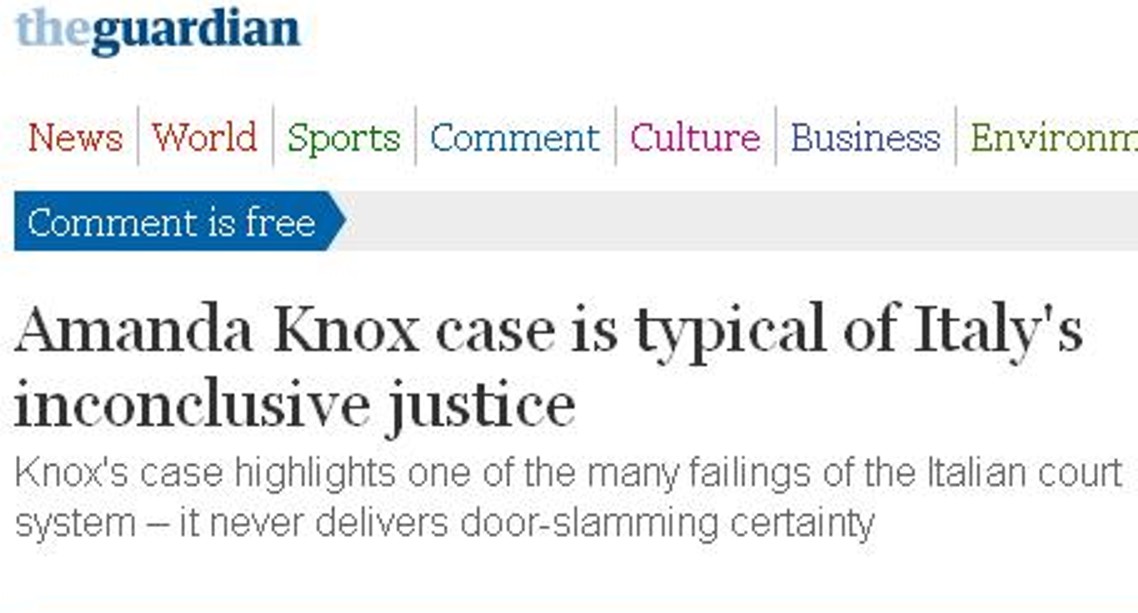
Political & economic headsup: US is demonstrating unsorted systems problems in spades. Do watch your investments. As Washington DC policy gets more & more off-target, big New York investors are betting very heavily that stocks will soon crash. Gross systems mismanagement 2017-20 tanked stocks several times.
Category: UK Guardian
Tuesday, October 04, 2011
The Guardian Publishes A Negative Take On Italian Justice Rather Poorly Researched
Posted by Peter Quennell

Click above for Tobias Jones’s take in the Guardian which seems to be trying to report evenly on the case..
Here are our most-read posts on first trials by Italian poster Nikki and the two appeals by Italian poster Commissario Montalbano and often-overlooked victims’ rights about Italian campaigner Barbara Benedettelli.
All explain better than Tobias Jones does the many hoops that prosecutors have to jump through for victims’ interests to come out ahead..
We can agree with Tobias Jones on this below - the elaborate, expensive and slow automatic first appeals complete with lay judges who don’t see the first pass of the evidence at first trial and often act as a wildcard in the process.
It’s one of the many failings of Italian justice that it never delivers conclusive, door-slamming certainty. What usually happens is that the door is left wide open to take the case to the next level, first to appeal and then to the cassazione, the supreme court. The score in the public imagination, at the moment, is simply one-all.
It’s always been that way. There’s barely one iconic crime from the post-war years that has persuaded the country that, yes, justice has been done: the murder of Pier Paolo Pasolini, the Ustica crash, the Bologna railway station bombing, the Piazza Fontana atrocity, the Monster of Florence murders, the murder of Luigi Calabresi, the “caso Cogne” “¦ none has ever been satisfactorily, convincingly resolved. Instead the country seems to split into innocentisti and colpevolisti (those who believe in the innocence or guilt of the accused) and the heated debates continue for decades.
But we’d agree less-so, at least from an American perspective, with the Italian uniqueness of this below.
Dietrologia ““ literally “behindery” or conspiracy-theorising ““ is a national pastime precisely because the courts don’t offer convincing verdicts. It allows every journalist, magistrate and barfly to try their hand. The result is that everyone with an active imagination has a go at explaining the truth behind the mystery, and inevitably the truth only gets further buried beneath so many excited explanations. The media plays an active role in keeping the circus going: in no other country are cronache nere ““ “black chronicles” ““ so much the mainstay of the evening news. There’s always a case on the go.
Tobias Jones should watch the urbane elegance of the Porta a Porta shows, which are reminiscent of human games of chess, and then visit the US and watch all the cable news channels devoting many hours a day to legal talking heads debating one another over high-profile crime cases. CNN and MSNBC could probably not survive without them (Casey Anthony was a godsend) and they go back to the OJ Simpson trial when it seemed half the country joined in.
He probably has a good point about subjudice (blackouts on court news in the UK) but there’d seem more chance of a wrong outcome driven by public opinion in the US with its elected judges and police chiefs and prosecutors angling for news exposure than in Italy. (Judge Michael Heavey is an elected judge.)
Local public opinion in the US is very much behind the high execution rate in several American states and the difficulties non-whites often have in getting off.
